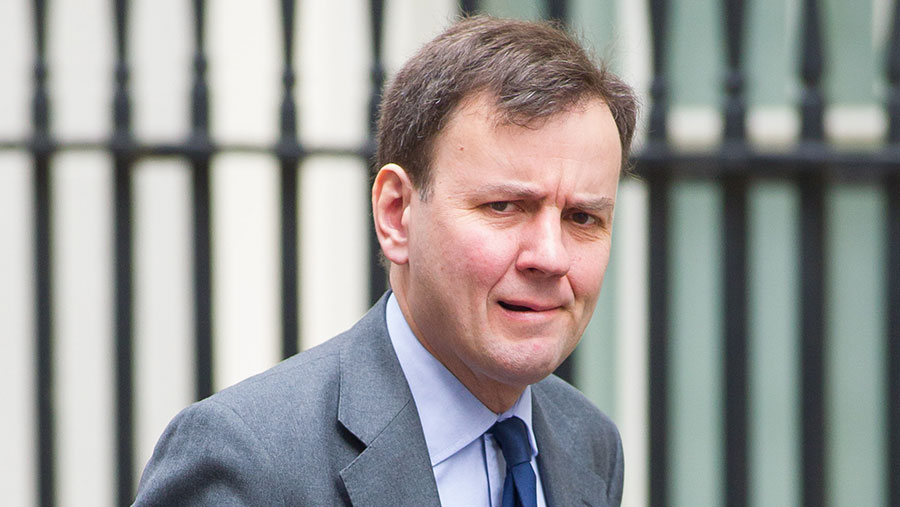Trade minister grilled on agri-food post Brexit
 © Tim Scrivener and ING
© Tim Scrivener and ING The future of the agri-food sector after the UK leaves the EU was under scrutiny in Parliament on Wednesday (6 June) as, Liam Fox’s number two, Greg Hands MP appeared before the Environment, Food and Rural Affairs select committee.
The international trade minister was quizzed on prospective reductions to UK food and welfare standards, the prospects for the British sugar industry, future free trade arrangements, tariff rate quotas (TRQ) and the performance of his department.
Here’s what he said when asked:
- Will the UK lower food standards as part of a free-trade deal with the likes of the US?
- Where does the UK stand in terms of negotiating free-trade arrangements?
- How are discussions going over the division of trade-rate quotas post-Brexit?
- How will Brexit influence the UK sugar beet industry?
- Is the Department for International Trade prepared for Brexit?
See also: US leads opposition to UK-EU post-Brexit import quota plan

Greg-Hands © REX/Shutterstock
Will the UK lower food standards as part of a free-trade deal with the likes of the US?
What Mr Hands said: “The government is absolutely clear that we will not be lowering any of our food standards, animal welfare standards or environmental standards as we leave the EU.
“One of the reasons why the food and drink sector is such an exporting success is precisely because people recognise the quality of our food and drink so it would be perverse for us to do anything to bring into question people’s liking of the quality of UK food and drink.
“I think a lot of sectors are really looking forward to having our trade deals and to export more food and drink in the future.”
However, Mr Hands repeatedly refused to directly answer whether food produced under lower welfare standards than in the UK, such as chlorine-washed chicken would be allowed to enter under a free-trade arrangement.
He eventually conceded: “Any imported products would have to meet UK standards. Whether it be in agriculture or in anything else.”
Where does the UK stand in terms of negotiating free-trade arrangements?
What Mr Hands said: “We have set up 14 trade working groups involving 21 countries, however not all of these countries will lead to a free-trade agreement.”
Mr Hands also confirmed the UK can negotiate, sign and ratify new trade deals after March 2019 but cannot bring these into effect before 1 January 2021.
He added there are no trade working group with any Mercosur nations.
“A lot of these working groups coincide with countries that have TRQ’s such as Australia and New Zealand so you can see the read across to where future free-trade deals might be going,” said Mr Hands.
How are discussions going over the division of TRQ’s post-Brexit?
“TRQ’s will remain in place between the UK and the EU until December 2020.
“I’m optimistic that UK would come to a positive conclusion with the World Trade Organization (WTO) over TRQ’s.”
Mr Hands admitted the entirety of some our TRQ’s such as lamb from New Zealand or sugar from Brazil could still come to the UK following Brexit.
Last September, the US, Argentina, Brazil, Canada, New Zealand, Thailand and Uruguay wrote an open letter stating they would not accept any splitting of current TRQ’s between the UK and the EU.
“WTO is an organisation that by its very nature believes in free trade,” said Mr Hands.
“The same members who have an interest in some of those TRQs are the same countries welcoming the UK in becoming a stand-alone member of the WTO.
“But it’s a negotiation that is ongoing and in common with all negotiations that are ongoing it’s difficult to provide a running commentary and it’s difficult to provide absolute certainty.”
See also: Why an EU trade deal could hurt beef prices after Brexit
How will Brexit influence the UK sugar beet industry?
What Mr Hands said: “Exiting the EU presents opportunities for the sugar industry and it is down to the government to enable an innovative and productive sector that is competitive at home and overseas.”
Mr Hands reiterated the UK’s long-standing commitment to reduce poverty through trade with developing sugar-cane-producing nations.
“Removal of EU sugar beet quotas in October 2017 is allowing British growers to move towards competing on a level playing field with other producers around the world.
We are rising to the occasion Greg Hands, MP
“The government committed to help the industry to further develop its competitiveness.”
Is the Department for International Trade prepared for Brexit?
What Mr Hands said: “We are rising to the occasion. The department has gone from 50 to 500 staff working in the trade policy group.
“The department that is battle ready for those negotiations in March 2019.
“It’s not just about trade deals, we can do a lot about reducing trade barriers outside of trade deals.
